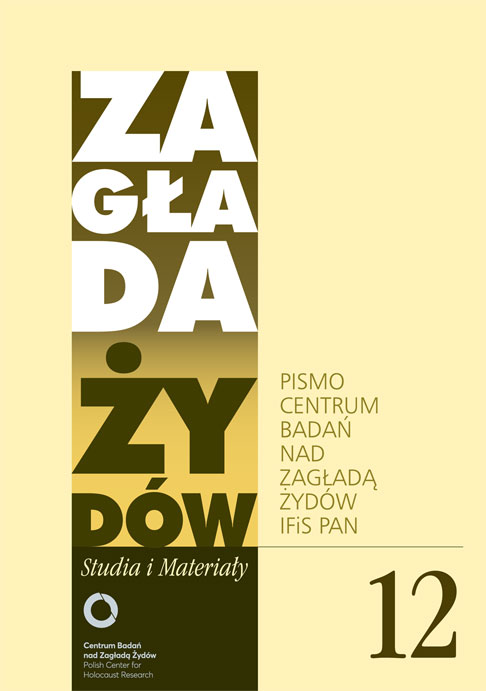The Sonderdienst in the General Government
Zagłada Żydów. Studia i Materiały, No. 12 (2016), Pages: 91-118
Submission Date: 2020-10-19Publication Date: 2016-11-30
 https://doi.org/10.32927/ZZSiM.409
https://doi.org/10.32927/ZZSiM.409
Abstract
The Sonderdienst (Special Service) was an enforcement agency developed by German SS and Police authorities, specifically in the Lublin District of the so called Government General (central and southeastern German-occupied Poland) to assist in enforcing German occupation ordinances in the cities and particularly in the countryside, where lack of police personnel, ignorance of local conditions, and perceived fear of partisan attack discouraged a direct German police presence. After February 1941, the SS and Police relinquished control over the Sonderdienst to the German civilian occupation authorities. Under civilian authority, the Sonderdienst was deployed at the Kreis level, under command of the so-called German Stadt- and Kreishauptmänner in detachments of approximately 30 men to carry out administrative enforcement activities when the civilian authorities were unable to count or SS and police support. This article examines how the Sonderdienst highlights the dependence of German administration in the Government General on locally recruited auxiliaries, particularly in the countryside. The Sonderdienst was conceived, developed, expanded, and deployed within the context of a bitter battle between German civilian authorities and the SS/police apparatus over control of local executive police power. This is hardly new; yet the Government General is unusual in that the German civilian authorities were able to fight the SS to a draw on this issue. Since its formation followed the recruitment of the “ethnic” and ideological “cream” of the ethnic German population of occupied Poland into agencies such as the Selbstschutz, and the Waffen SS, the Sonderdienst represents an early effort of the National Socialist authorities to fashion an ethnically conscious and ideologically committed corps from young men of questionable, even dubious, German ancestry and heritage. Finally, this study reveals not only the complicity of the civilian authorities in Nazi crimes, but the link in German-occupied Poland between “routine” administrative duties, such as collecting fines for ordinance violations, and the brutal persecution and annihilation of groups targeted as enemies of the German Reich, such as the Polish Jews. Civilian administrators and SS and police authorities shared the “National Socialist consensus” in occupied Poland. They wanted to annihilate the Jews and the Polish intelligentsia, to exploit the labor potential of the Polish masses, and to turn the Government General into a region of German settlement. As a part of this vision, the Sonderdienst was to serve not only as a police executive, but as a political and cultural steppingstone to full acceptance into the German “racial community.” There is no question that, even in “routine” duties, the Sonderdienst participated, more or less willingly, in the implementation of the most evil racist policies of the National Socialist regime.
Keywords
Sonderdienst , Government General
License
Copyright (c) 2016 Author&"Holocaust Studies and Materials"

This work is licensed under a Creative Commons Attribution 4.0 International License.
https://creativecommons.org/licenses/by/4.0
The journal is published under the Diamond Open Access Standard, CC-BY-4.0 Deed - Attribution 4.0 International - Creative Commons
Similar Articles
- Dariusz Libionka, Fight and Propaganda. The Uprising in the Warsaw Ghetto from the Perspective of the Polish Government in London , Zagłada Żydów. Studia i Materiały: No. 10 (2014)
- Zuzanna Schnepf-Kołacz, The Fate of Journalists of the German ‘Reptile Newspaper’ – Nowy Kurier Warszawski in the Light of Post-War Trials on the Basis of the ‘August Decree’ , Zagłada Żydów. Studia i Materiały: No. 2 (2006)
- Klaus Peter Friedrich, Nazi Murder on the Jews in Polish Communist Press (1942–1944) , Zagłada Żydów. Studia i Materiały: No. 2 (2006)
- Dariusz Libionka, The Fighting and the Propaganda: The Uprising in the Warsaw Ghetto from the Perspective of ‘Polish London’ , Zagłada Żydów. Studia i Materiały: No. Holocaust Studies and Materials (2017)
- Marcin Przegiętka, What did Adolf Gerteis, president of the Eastern Railway, know about the Holocaust? , Zagłada Żydów. Studia i Materiały: No. 20 (2024)
- Aleksandra Bańkowska, Jewish Social Self-help During Operation Reinhardt , Zagłada Żydów. Studia i Materiały: No. 13 (2017)
- Nawojka Cieślińska-Lobkowicz, Predator. The Looting Activity of Pieter Nicolaas Menten (1899–1987) , Zagłada Żydów. Studia i Materiały: No. Holocaust Studies and Materials (2017)
- Tomasz Frydel, The Polish Countryside as a Gray Zone: Village Heads as the Meso Level of the General Government, 1939–1945 , Zagłada Żydów. Studia i Materiały: No. 19 (2023)
- Nawojka Cieślińska-Lobkowicz, Professional Looter. On the looting activity of Pieter Nicolaas Menten (1899–1987) , Zagłada Żydów. Studia i Materiały: No. 11 (2015)
- Ewa Wiatr, At the Margin of the Functioning of Polish Courts in the General Government. Case of Majer Wolberg , Zagłada Żydów. Studia i Materiały: No. 11 (2015)
You may also start an advanced similarity search for this article.
 English
English
 Język Polski
Język Polski








